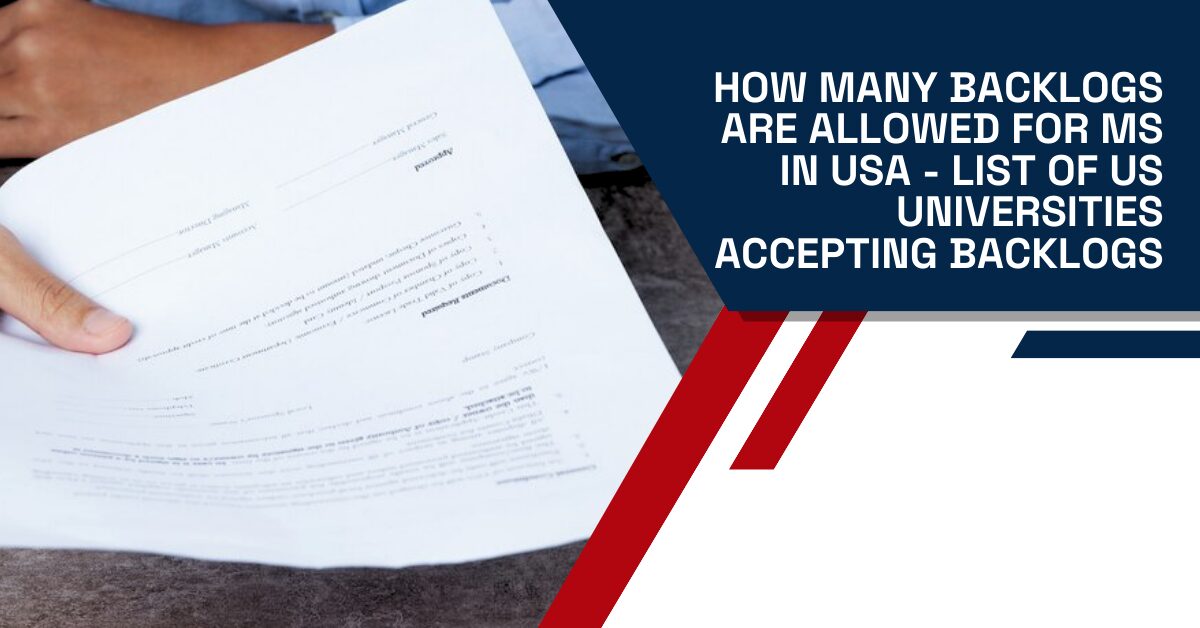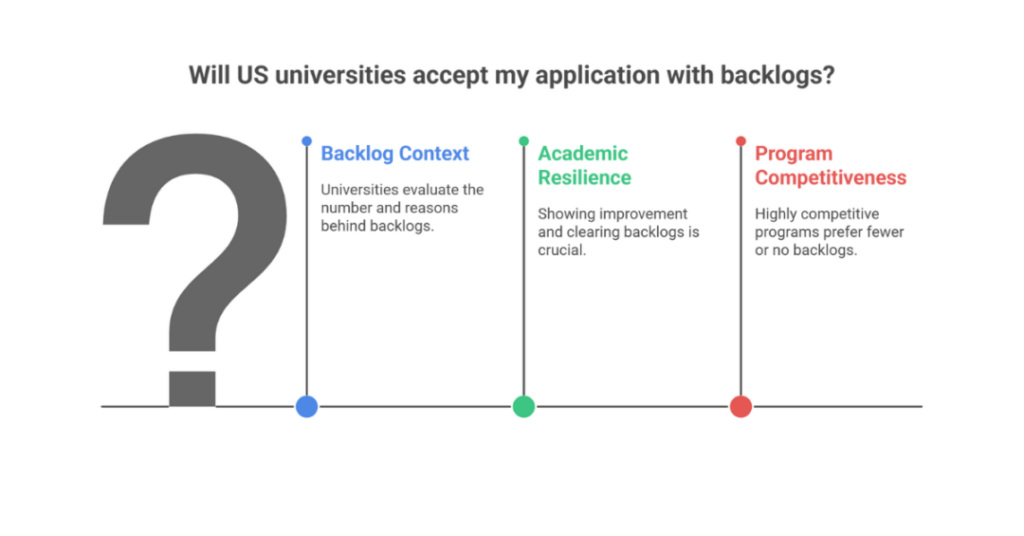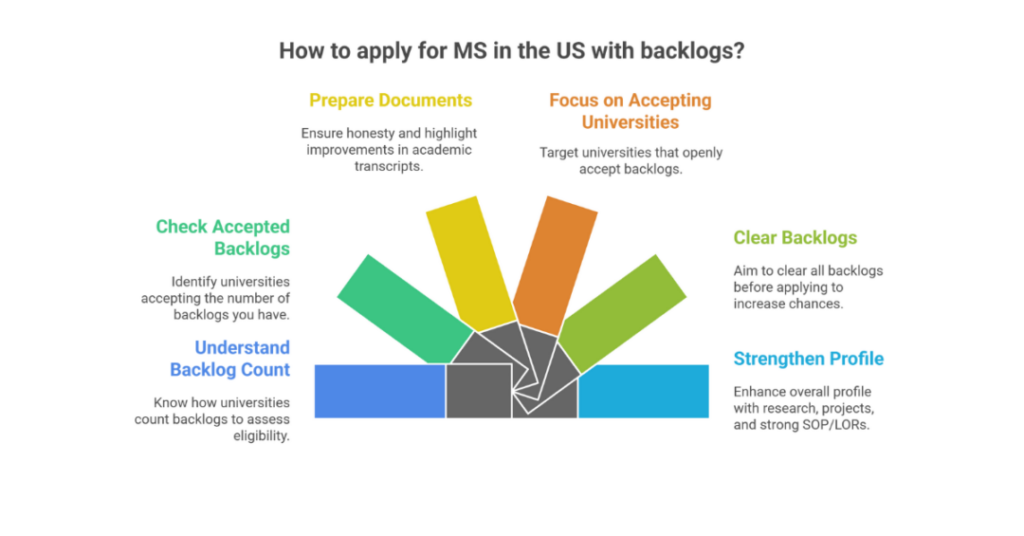28 August 2025
8 minutes read
How Many Backlogs Are Allowed For MS In USA – List Of US Universities Accepting Backlogs

Key Takeaways
- How many backlogs are allowed for MS in USA – most universities accept 2–5, while some flexible ones may allow up to 10–15, depending on your overall profile.
- Backlogs affect admissions differently – cleared (inactive) backlogs matter less, but repeated or active ones can impact acceptance unless balanced with strong GPA, GRE, or SOP.
- Universities accepting backlogs in USA evaluate holistically, so clearing all pending subjects and showcasing growth, projects, and strong recommendations boosts your chances.
Did you know that many US universities accept students with backlogs, understanding that a single metric does not define a student’s potential? This can be a significant relief for aspirants who worry that their academic hiccups could derail their dreams of studying abroad. The fear of not meeting stringent academic requirements often causes stress and uncertainty among students, especially when they aim to clear inactive or active backlogs.
Fortunately, there’s good news. Our comprehensive guide provides an extensive list of US universities accepting backlogs, shedding light on policies and the maximum number of backlogs considered.
What Is A Backlog?
In simple terms, a backlog in academic terms refers to any course or subject that a student has not passed during their first attempt. This can either be due to failing the course or withdrawing from it, which then requires the student to retake it in a subsequent semester.
Backlogs can be classified into two types: active and inactive backlogs. Active backlogs are those courses that a student has yet to pass, while inactive backlogs have been successfully cleared but still appear in the student’s record.
Most US universities have specific policies on how many repeated backlogs are allowed for MS programs in the USA, reflecting their approach to assessing a student’s academic perseverance and capacity to overcome educational challenges. Clearing your backlogs effectively is often seen as a sign of resilience and determination, qualities that are highly valued in the academic community.
| Aspect | Active Backlogs | Inactive Backlogs |
|---|---|---|
| Definition | Unresolved subjects/courses | Previously unresolved subjects/courses |
| Status | Pending completion | Completed but with failed grades |
| Effect on Graduation | Can delay graduation | May not affect graduation |
| Course Retake | Required | Optional |
| Academic Progress | Hindered | Unaffected |
| Study Opportunities | Limited | Unrestricted |
| Employment Opportunities | Restricted | Unrestricted |
| Study Abroad Opportunities | Restricted | Unrestricted |
| Financial Aid Eligibility | Affected | Unaffected |
| Future Education Pursuits | Affected | Unaffected |
| Academic Record | Reflects outstanding subjects | Reflects past failures |
Do US Universities Accept Backlogs?
Yes, many US universities do accept students who have backlogs, but their acceptance largely depends on the context of those backlogs and the student’s overall academic and extracurricular profile. Generally, universities evaluate the number of backlogs, the reasons behind them, and whether the student has successfully cleared them.
Universities accept backlogs under certain conditions. They tend to look for signs of improvement and academic resilience, meaning that a student has actively worked to clear their backlogs and has shown academic progression despite setbacks. Schools often consider the number of backlogs and distinguish between active and inactive backlogs. An active backlog might require the student to clear it before enrollment, while inactive ones, which have been resolved, are viewed less stringently.

Moreover, while backlogs are allowed for MS programs in USA, each university will have its own threshold for the maximum number of backlogs it considers acceptable. Some schools might be more lenient and accept students with a higher number of backlogs if other aspects of their application are strong, such as GRE scores, research experience, or professional work. Others might be stricter, especially highly competitive programs, which prefer students with fewer or no backlogs.
List Of US Universities Accepting Backlogs For MS
Pursuing a Master’s degree in the United States presents a golden opportunity, even for students who have encountered academic setbacks. Many prestigious institutions understand that a student’s journey is not always straightforward and offer a chance to those who have worked diligently to clear their backlogs. If you’re concerned about the number of backlogs accepted, you’ll be relieved to know that several universities evaluate applications holistically, considering other strengths that a candidate brings to the table.
| University Name | Maximum Number of Backlogs Accepted | Notes |
|---|---|---|
| University of Illinois Urbana-Champaign | 5 | Must be cleared before admission |
| Texas A&M University | 3 | Prefers backlogs in non-major subjects |
| University of Southern California | 5 | Requires explanation for each backlog |
| Arizona State University | 2 | No active backlogs accepted |
| University of Texas at Arlington | 4 | Encourages clearing backlogs before application |
| North Carolina State University | 3 | Prefers minimal repeated backlogs |
| Ohio State University | 5 | Requires academic progression post-backlogs |
How to Apply for MS in the US with Backlogs?
Studying for an MS in USA is a dream for many students, but having backlogs often raises doubts.

The good news is that many USA universities accept backlogs depending on the number, type, and other factors.
- Understand How Backlogs Are Counted
- In a country like the USA, universities count both active and inactive backlogs.
- Repeated backlogs or repetitive backlogs may increase your count.
- Most American universities prefer students without backlogs, but many universities that accept backlogs are available.
- Check the Number of Backlogs Accepted
- Some top universities in the US prefer students with no backlogs.
- A maximum of five backlogs (5 backlogs are accepted) is common in good universities.
- 10 backlogs or even 10–15 backlogs can still get acceptance at universities in the US that are more flexible.
- In rare cases, some universities accepting 20 backlogs exist, but opportunities may be limited.
- Generally, 15 is the maximum number accepted for MS in USA.
- Know the Factors Affecting Acceptance of Backlogs
- Number of attempts for each subject (more attempts may affect the acceptance of backlogs).
- Whether the backlogs are active or cleared.
- Repetitive backlogs are considered more negatively than single attempts.
- Your overall GPA, GRE/GMAT scores, and SOP/LOR quality can reduce the impact of backlogs.
- Prepare Documents Carefully
- Be honest about details about your backlogs in your academic transcripts.
- Highlight improvements and show that you don’t have any backlogs currently.
- If you had active backlogs, explain how you cleared them.
- Focus on Universities Accepting Backlogs in the USA
- Many universities in the United States clearly mention the number of backlogs they accept.
- Some universities based on the number of backlogs they accept may allow up to 10–15 backlogs.
- Universities that may accept students with 15 backlogs often look at your overall profile strength.
- Shortlist Universities Wisely
- Create a list of universities accepting backlogs (or specifically, a list of USA universities accepting 10–15 backlogs).
- Some universities in the US prefer students without backlogs, but others accept students with backlogs after considering overall performance.
- While applying, keep a list of some well-known institutions that openly allow backlogs for MS programs.
- Clear All Your Backlogs Before Applying
- While backlogs are allowed for MS in USA, having no active backlogs increases your chances.
- Most universities accepting backlogs in USA require proof that you have cleared all your backlogs before admission.
- Balance with a Strong Profile
- Show research experience, projects, and internships.
- Write a strong SOP explaining your passion for your field.
- Secure recommendation letters that highlight your strengths beyond academics.
Factors Affecting Acceptance Of Backlogs In US Universities
Imagine you’ve worked hard through college, only to find out that your past academic hiccups might stand in the way of your dream to study in the US. Don’t worry; you’re not alone. Many students face this challenge, and understanding the key factors can help you navigate through it. The good news is that universities look at a variety of elements beyond just backlogs, and a holistic approach can often work in your favor.
Here are the 9 factors affecting the acceptance of backlogs in US universities, expanded in detail:
Number of Backlogs
The total number of backlogs you have accumulated can significantly impact your application. Universities usually have a threshold, and if your backlogs exceed this number, it may be harder to gain acceptance. However, this threshold can vary greatly between institutions. For instance, some universities might consider applications with up to 5-6 backlogs, while others might be stricter. It’s crucial to research the specific requirements of each university to which you are applying.
Relevance to Major
Backlogs in core subjects related to your intended major are often scrutinized more closely than those in unrelated subjects. Admissions committees look at how these backlogs might affect your ability to succeed in your chosen field of study. For example, if you are applying for a master’s in computer science and have backlogs in programming courses, this could be more detrimental than backlogs in general education courses. Demonstrating strong performance in key areas related to your major can help mitigate concerns.
Pattern of Backlogs
A scattered pattern of clearing the backlogs is generally more acceptable than having multiple backlogs in consecutive semesters. This pattern can indicate whether the backlogs were due to an isolated issue or a consistent struggle. For instance, if backlogs occurred during a single semester due to personal or medical issues, this might be viewed more leniently than consistent backlogs every semester. Highlighting any upward trend in your grades over time can also show your ability to overcome challenges.
Time Taken to Clear Backlogs
How quickly and efficiently you managed to clear your backlogs also matters. If you took extra semesters or years to clear them, it might raise concerns about your academic preparedness. However, if you cleared them promptly while maintaining or improving your overall grades, it can demonstrate determination and resilience. Admissions committees often appreciate applicants who show perseverance and improvement over time.
Overall Academic Performance
Your cumulative GPA or overall academic performance can sometimes offset the negative impact of backlogs. A strong academic record despite a few backlogs can demonstrate resilience and capability. For example, maintaining an average GPA score while managing and clearing backlogs can reflect well on your ability to handle academic pressure. Additionally, excelling in projects, internships, or other academic endeavours can further strengthen your application.
Performance in Standardized Tests
High scores in standardized tests like the GRE, GMAT, or TOEFL can help balance out the backlogs. These scores can show your potential and readiness for graduate studies. For example, a strong GRE score can indicate your proficiency in critical thinking, quantitative reasoning, and analytical writing, which are essential for success in graduate programs. Universities often consider these scores as a benchmark for your academic potential, helping to offset any concerns about your past academic performance.
Letters of Recommendation
Strong letters of recommendation from professors or professionals who can vouch for your academic abilities and explain the context of your backlogs can positively influence your application. These letters can provide insights into your strengths, work ethic, and ability to overcome challenges. A letter from a professor who acknowledges your backlogs but emphasizes your growth and current capabilities can be particularly powerful. It’s important to choose recommenders who know you well and can provide a detailed and supportive account of your academic journey – for example – you can have an academic letter of recommendation from your professor.
Personal Statement
A well-crafted personal statement that addresses your backlogs honestly and shows how you have grown from these experiences can make a big difference. It’s an opportunity to tell your story and show your determination. Use this space to explain any extenuating circumstances that contributed to your backlogs, such as health issues, personal challenges, or other significant factors. Highlighting what you learned from these experiences and how you have prepared yourself for future academic success can help admissions committees see you as a well-rounded candidate.
University Policies
Each university has its own policies regarding backlogs. Some are more lenient, while others are strict. Researching and applying to universities that are known to be flexible with backlogs can increase your chances of acceptance. For instance, some universities may have a holistic review process where they consider your entire profile, including work experience, extracurricular activities, and other achievements. Identifying and targeting these institutions can help you find a better match for your academic background.
How To Avoid Getting A Backlog?
Avoiding backlogs is crucial for a smooth academic journey. Here are five key strategies to help you stay on track:
- Stay organized: Keep a detailed calendar of all deadlines, exams, and assignments. Prioritize tasks and allocate time efficiently to avoid last-minute rushes.
- Attend classes regularly: Consistent attendance helps you stay engaged with the course material and catch important information that might be crucial for exams.
- Seek help early: Don’t hesitate to approach professors or tutors when you’re struggling with a concept. Early intervention can prevent small issues from snowballing.
- Practice time management: Break large tasks into smaller, manageable chunks. This approach helps prevent overwhelm and ensures steady progress.
- Maintain a balanced lifestyle: While academics are important, don’t neglect your physical and mental health. Regular exercise, proper sleep, and stress-management techniques can significantly improve your academic performance.
Conclusion
At last, many US universities are open to accepting students with backlogs for MS programs, recognizing that academic setbacks don’t define a student’s potential. The key factors influencing acceptance include the number and pattern of backlogs, their relevance to the chosen major, and how quickly they were cleared. Universities typically have varying thresholds for acceptable backlogs, ranging from 2 to 5 in most cases. However, they also consider other aspects of an application, such as GRE scores, overall GPA, and letters of recommendation.
Join Ambitio for a transformative learning adventure in the USA! Surround yourself with inspiration, share stories globally, and embrace hands-on education. Your journey starts here – Study in USA.
FAQs
Can I get admission to a US university with 15 backlogs?
It largely depends on the specific university and the course you’re applying for. Some universities might accept up to 15 backlogs, but this isn’t a universal rule. It’s crucial to check the university’s specific policies on backlogs.
What is a backlog certificate?
A backlog certificate is a document that provides details about your backlogs and the attempts you’ve made to clear them. This certificate is often required when applying to universities in the US.
Do all US universities accept backlogs?
The acceptance of backlogs varies from university to university and even from course to course within a university. It’s recommended to check with the specific university you’re interested in applying to.
What are active and inactive backlogs?
Active backlogs refer to subjects that you haven’t passed yet, while inactive backlogs refer to subjects you have cleared after one or more attempts but remain on your academic record.
Do backlogs affect my chances of studying in the US?
While backlogs can indeed impact your chances, they aren’t the only factor universities consider. Institutions also look at your overall academic performance, GPA, GRE scores, and the reasons behind the backlogs.

You can study at top universities worldwide!
Get expert tips and tricks to get into top universities with a free expert session.
Book Your Free 30-Minute Session Now! Book a call now




























